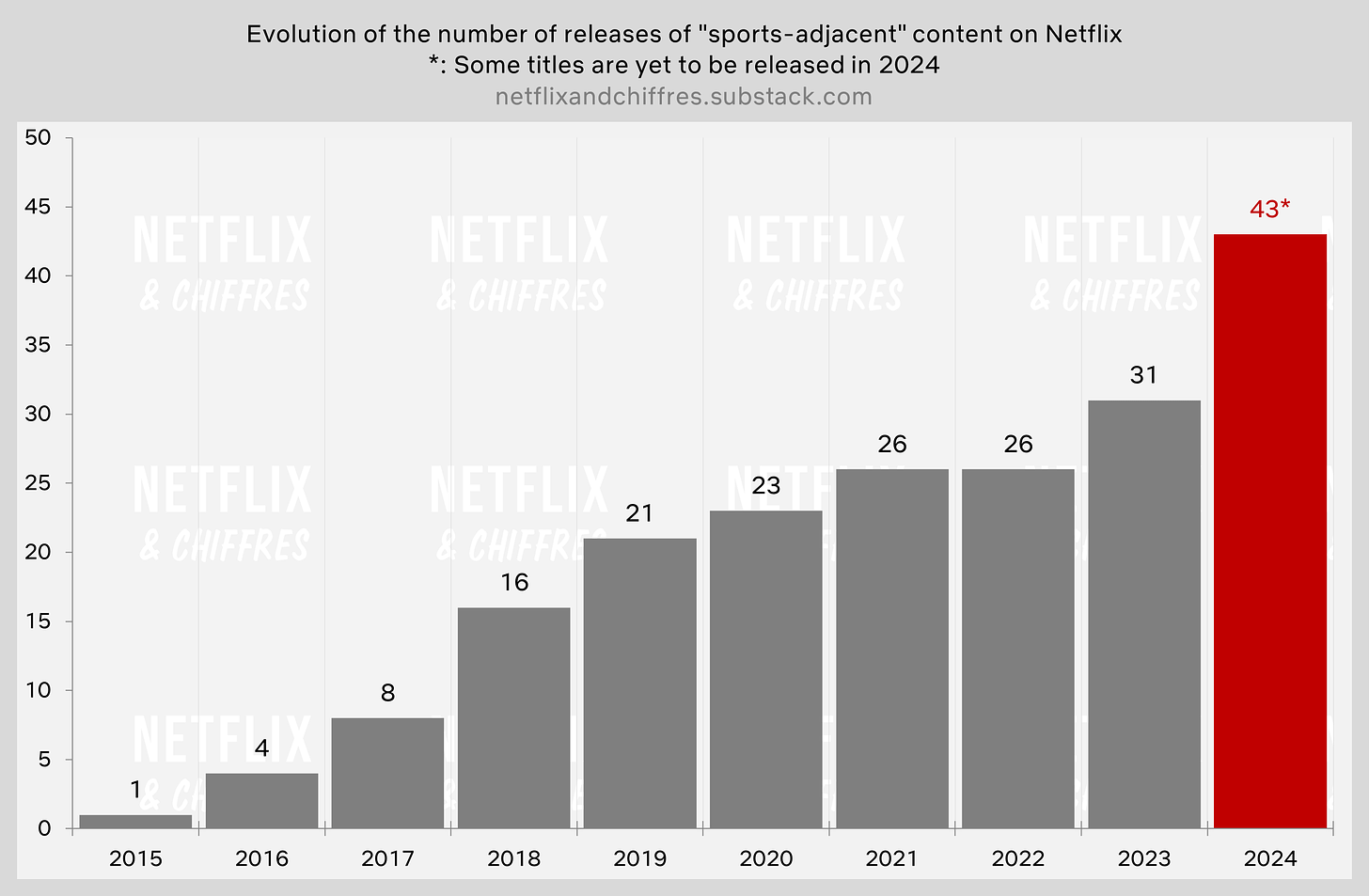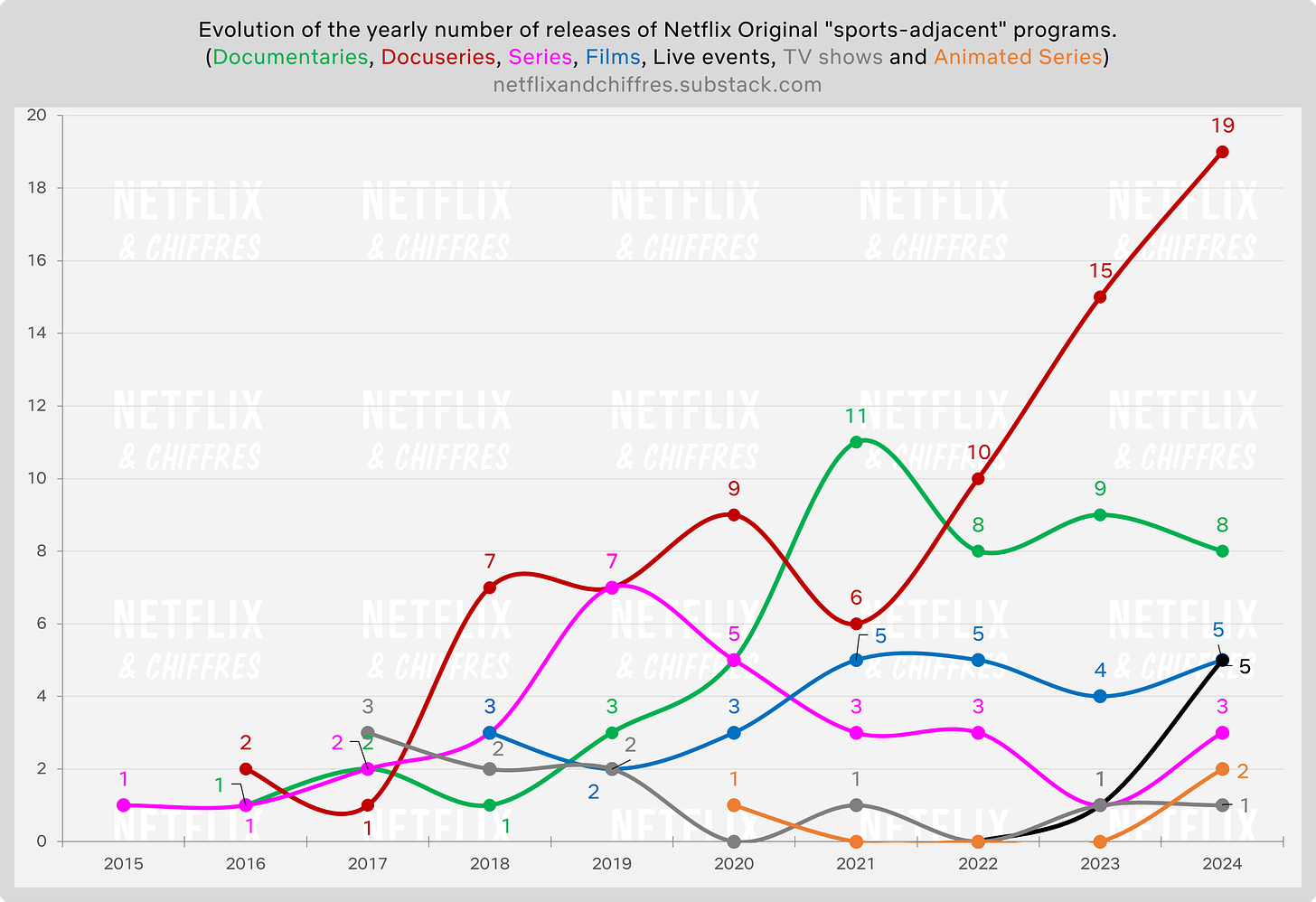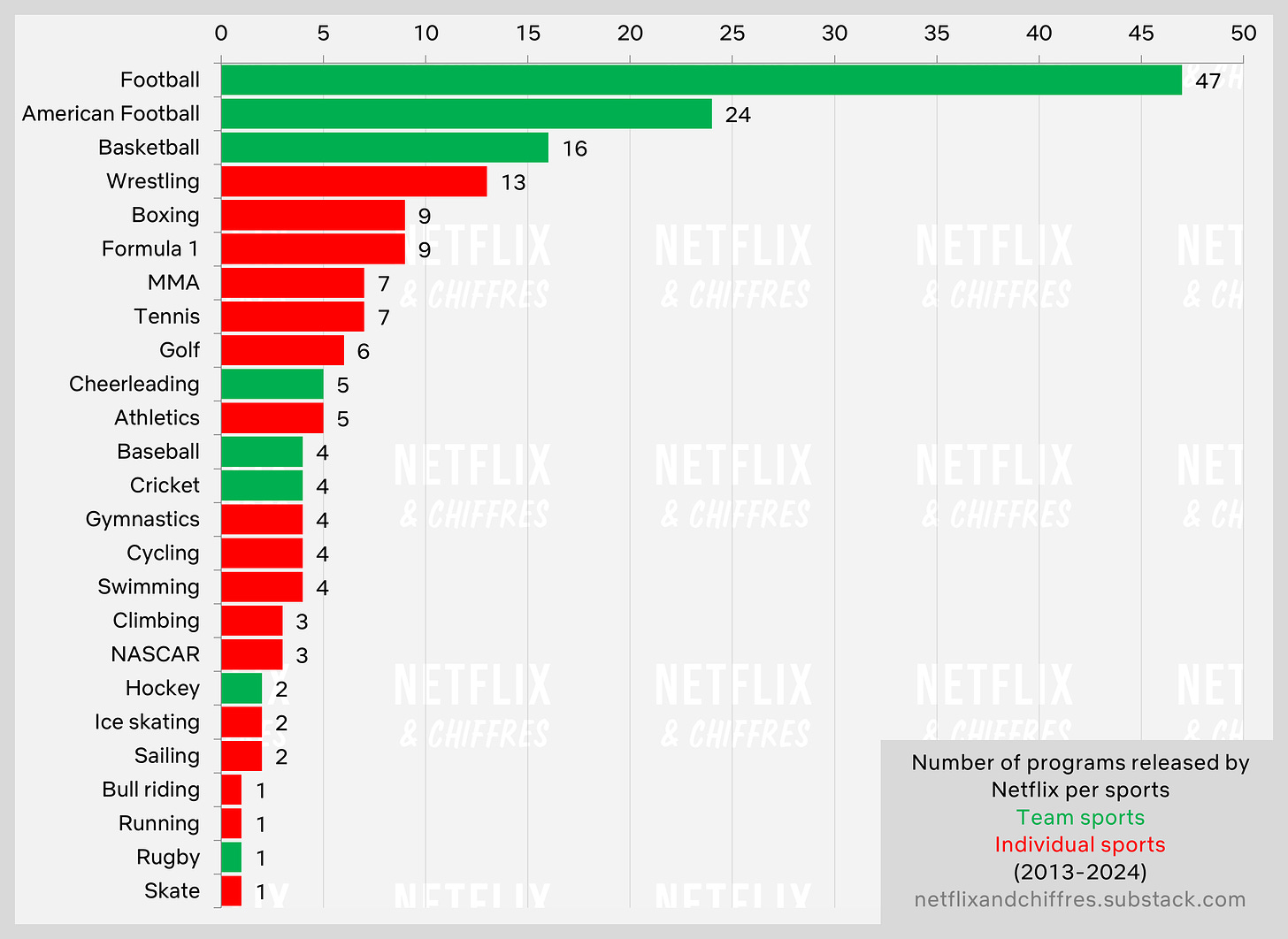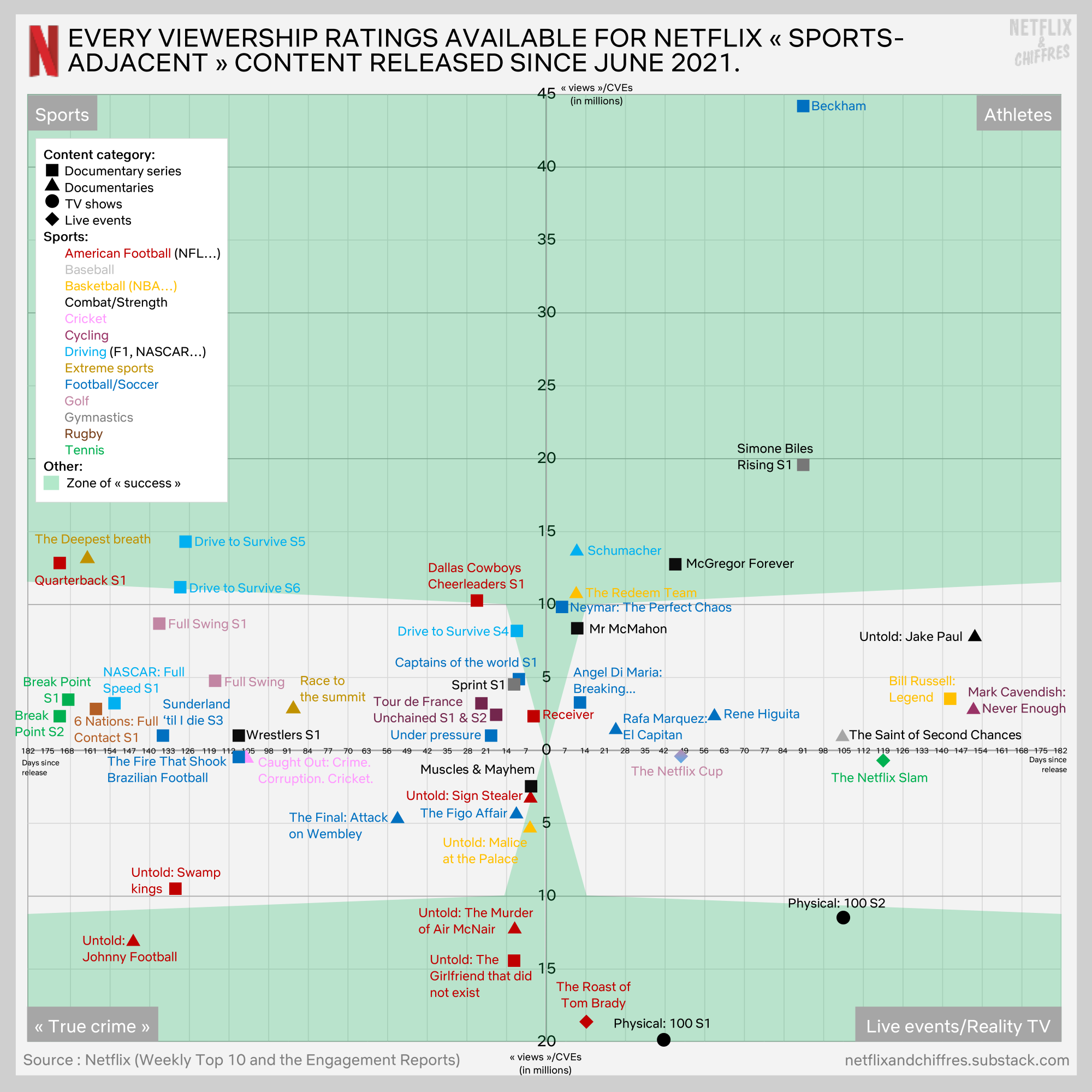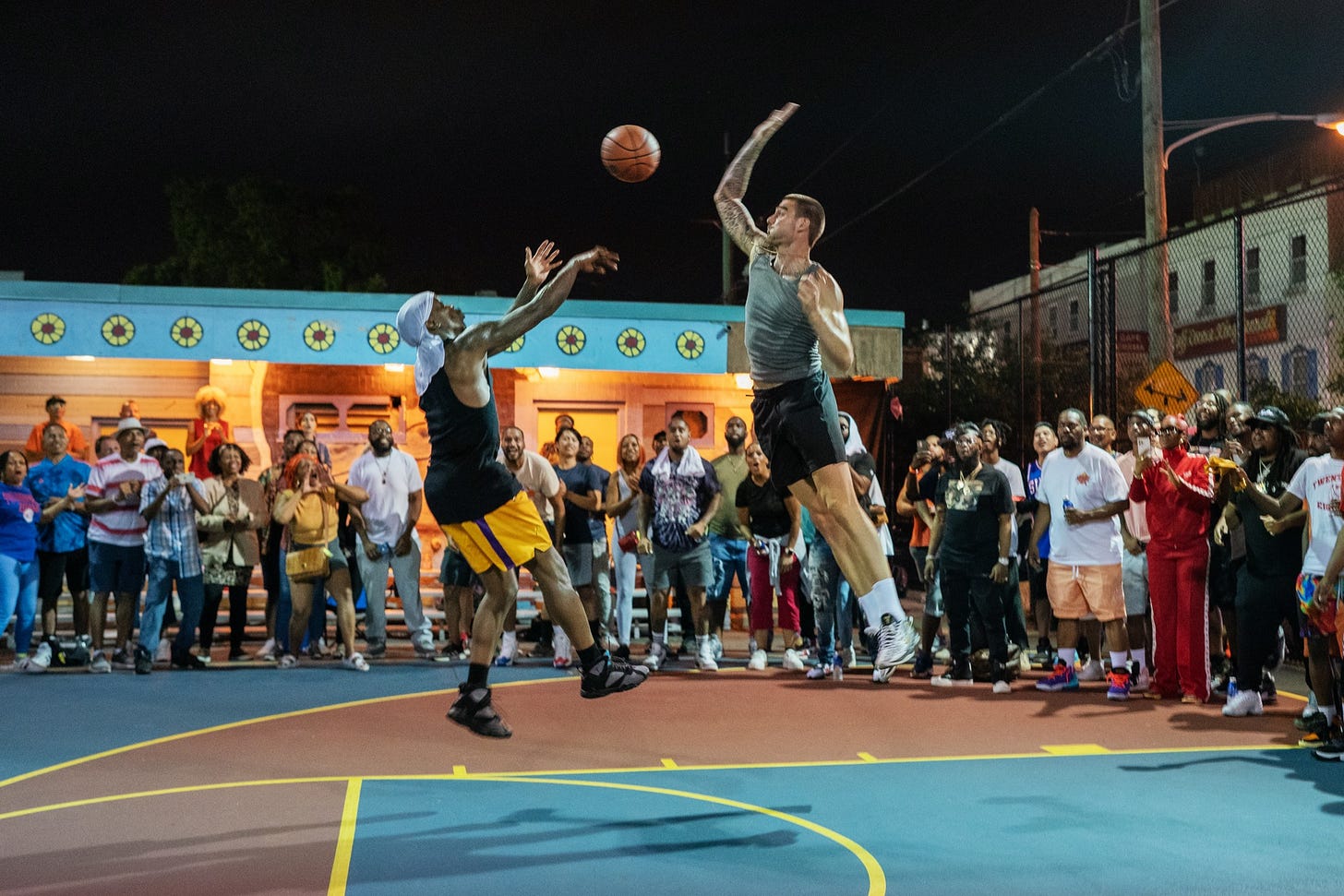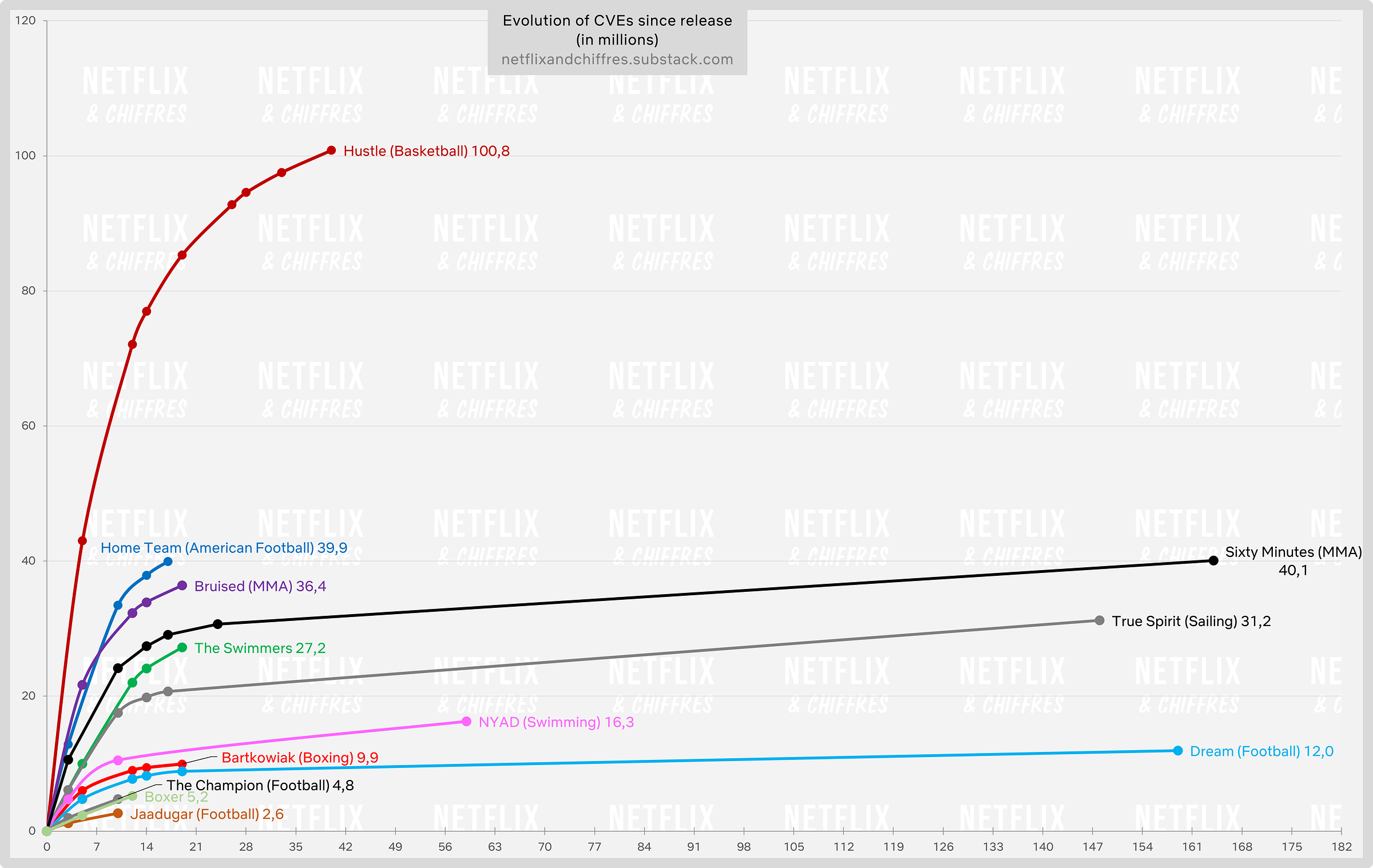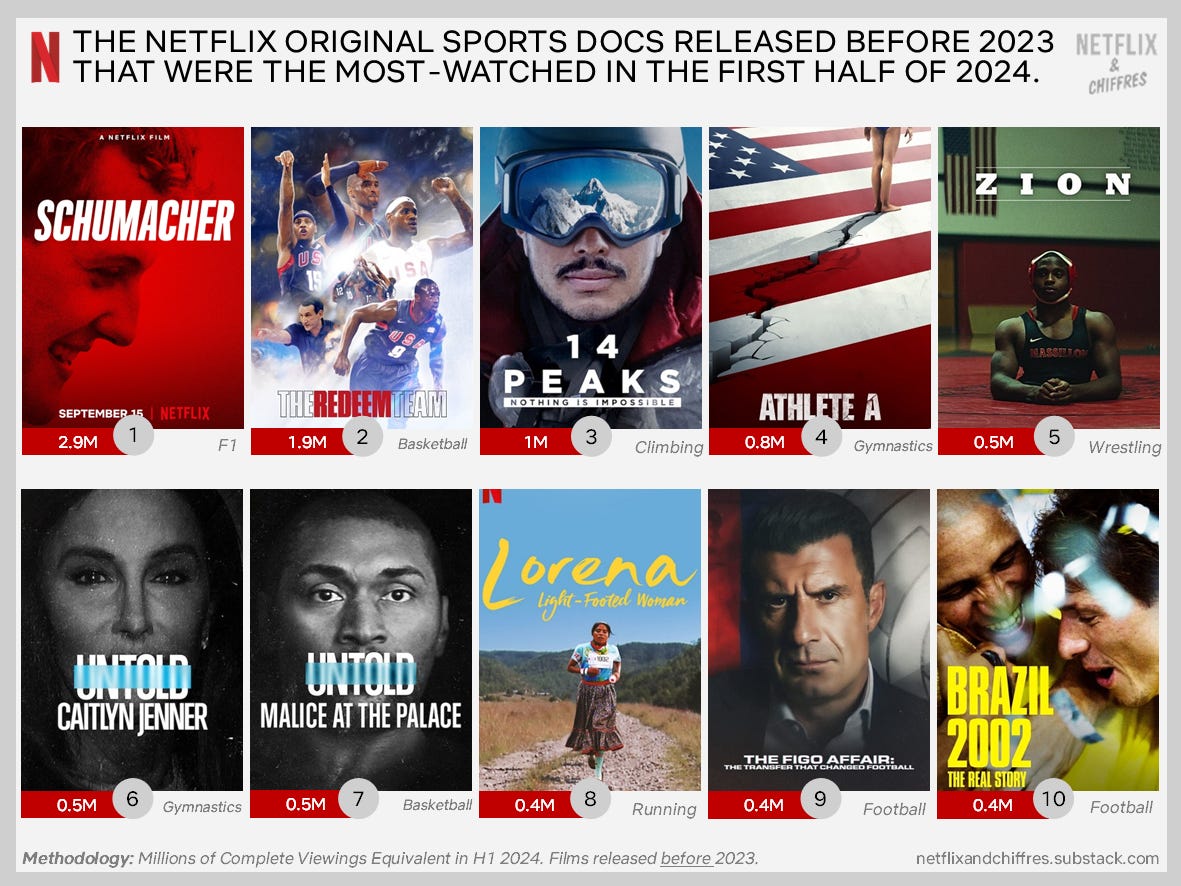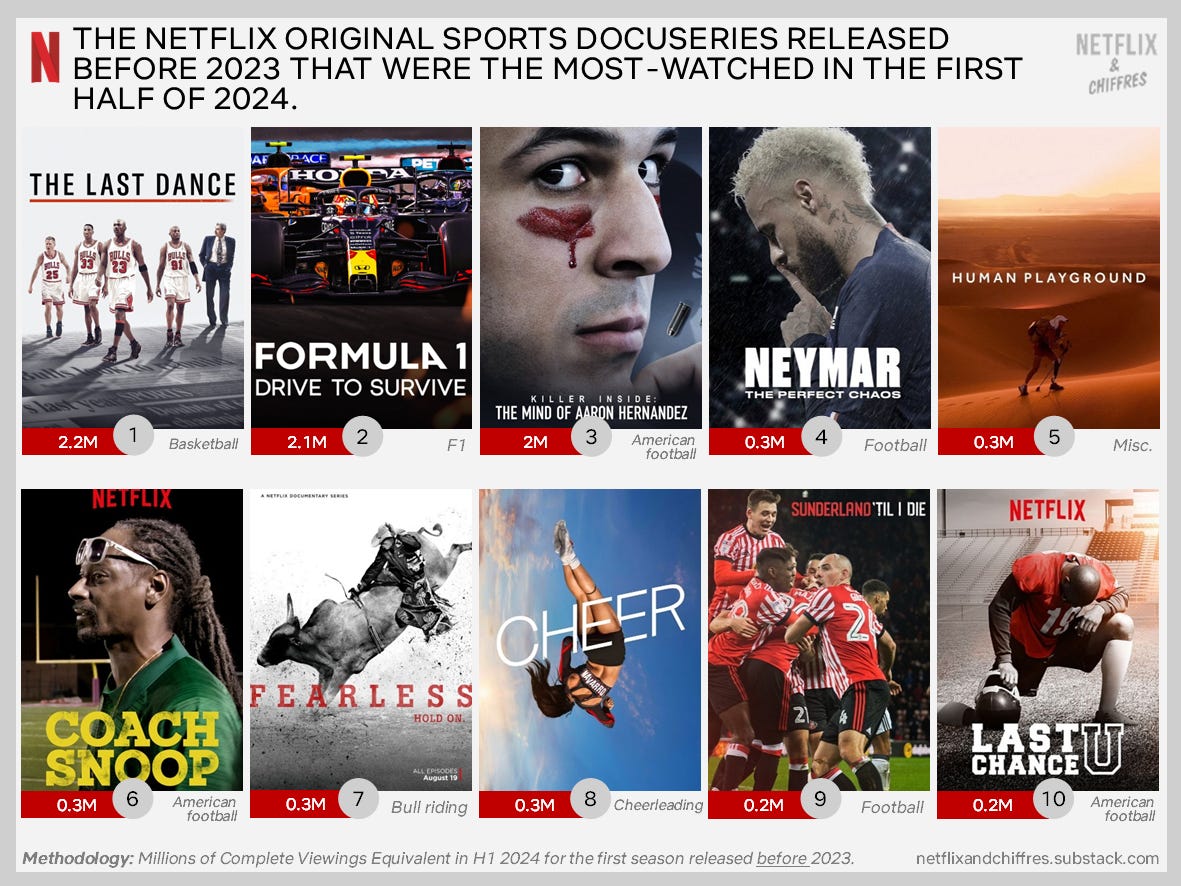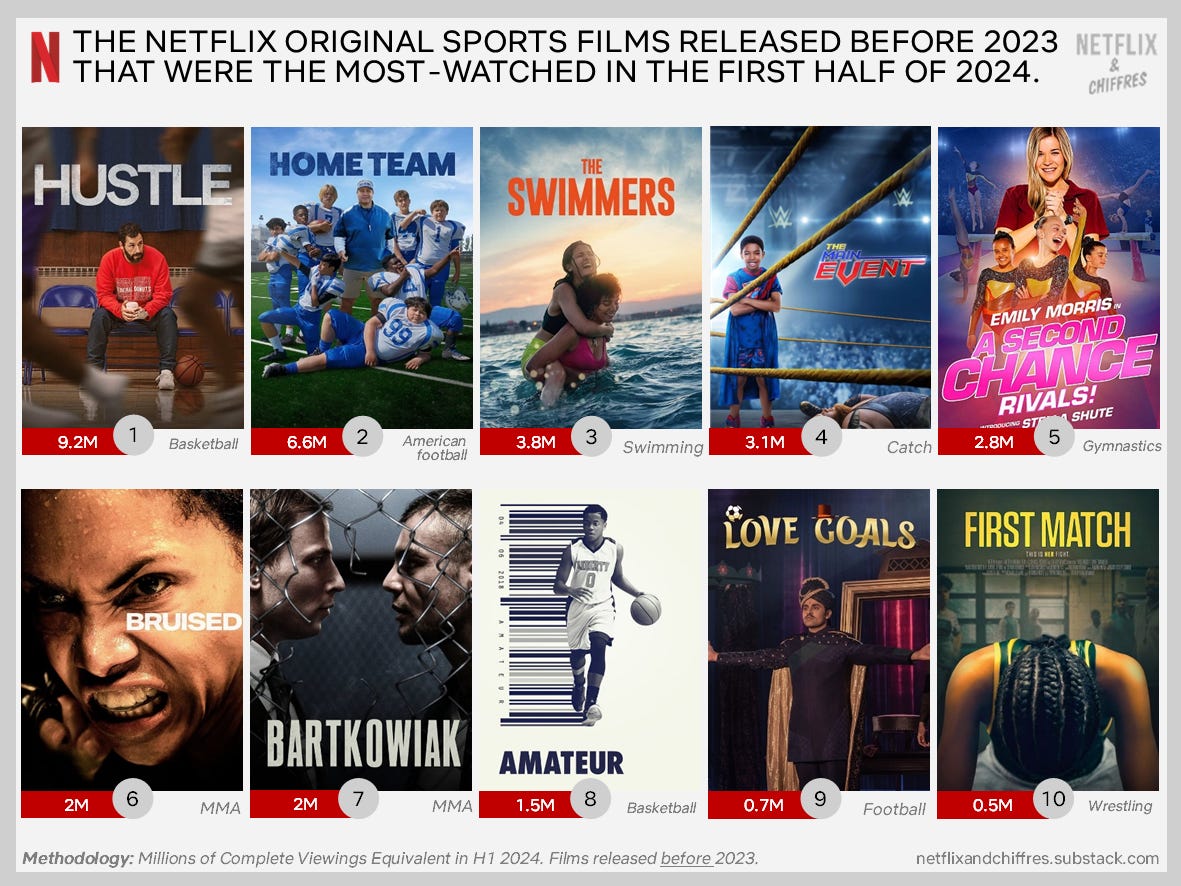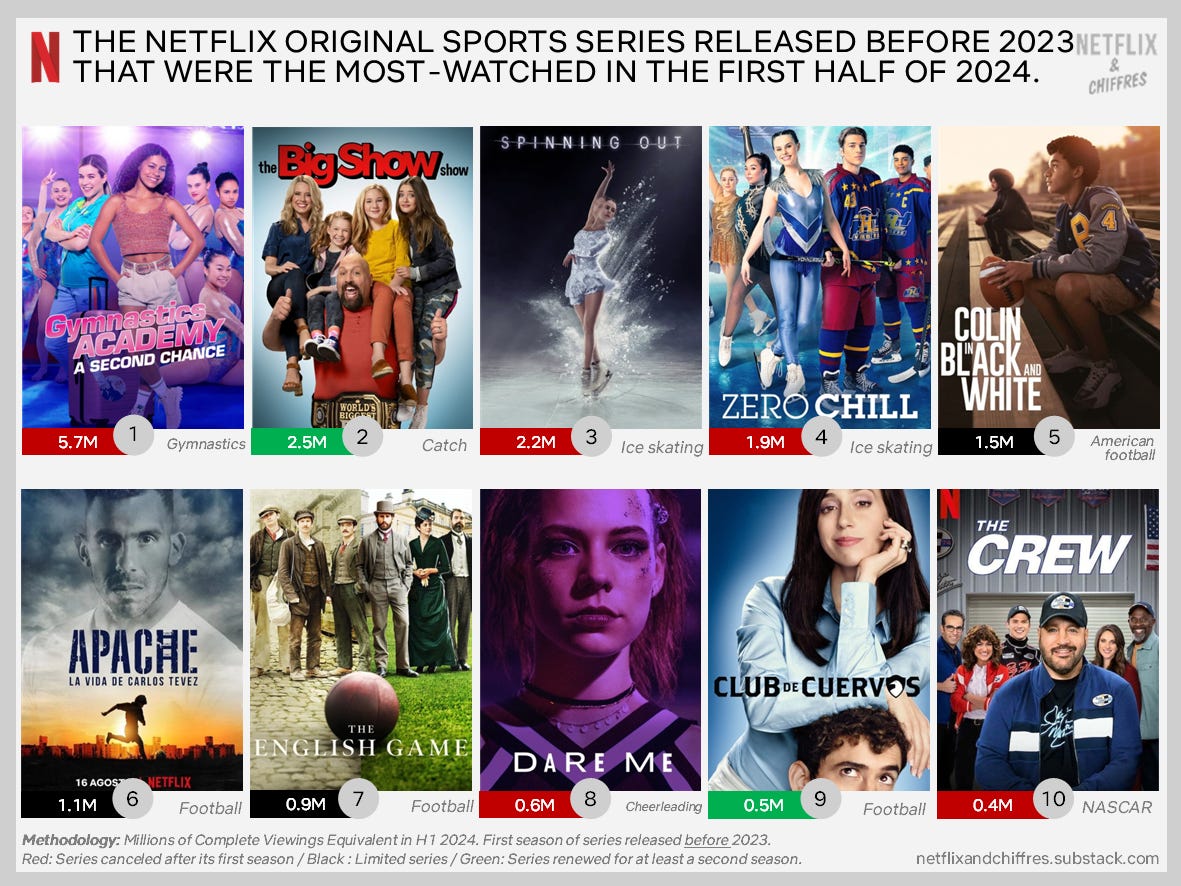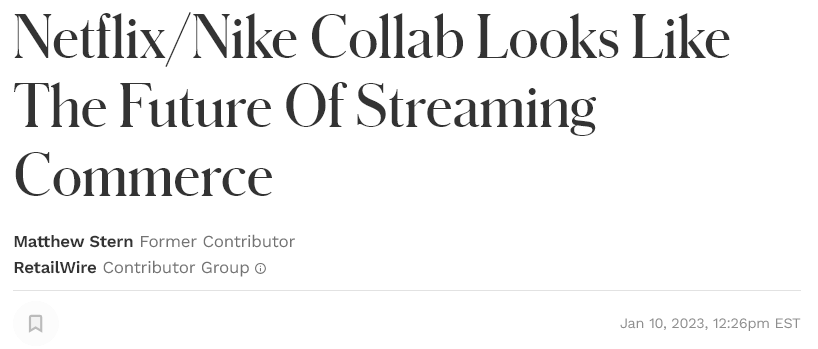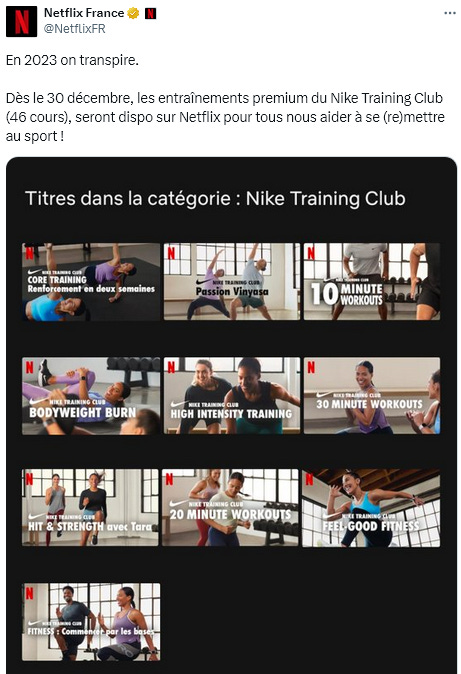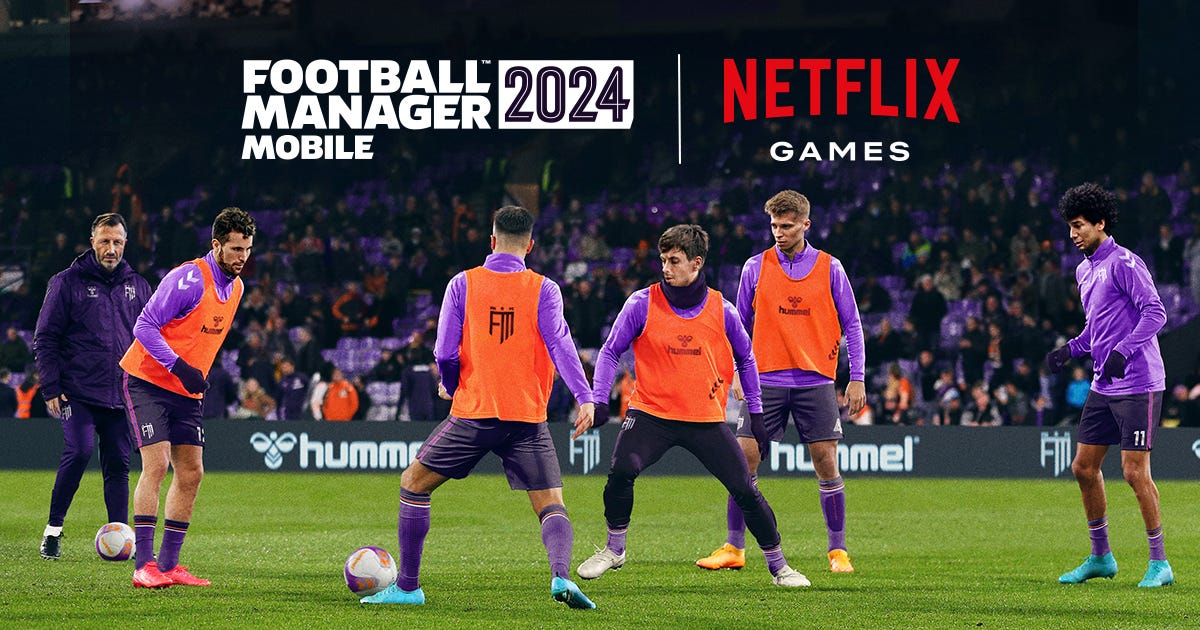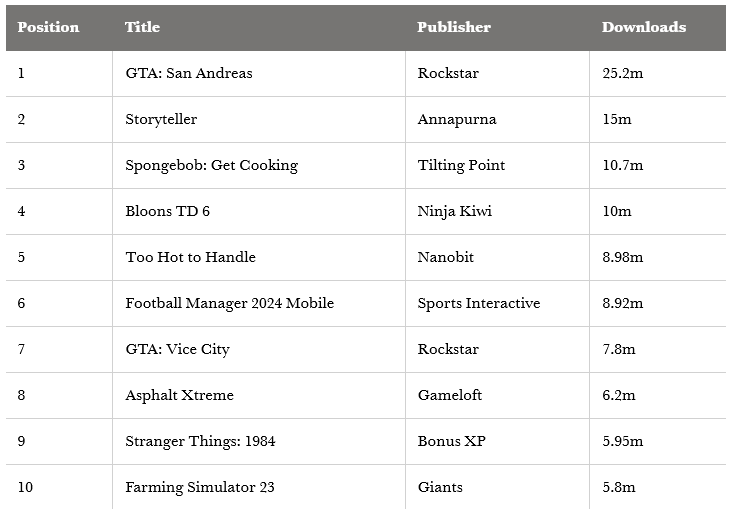Sports is a complicated beast and Netflix hasn't figured it out (yet).
Netflix has made sports and live content one of its development priorities for the coming years, and it may be time to take a look at the results of its efforts in this area over the past few years.
The Cage, Senna, the boxing match between Mike Tyson and Jake Paul, the NFL at Christmas, and the WWE at the beginning of 2025—Netflix’s upcoming weeks are set to be quite sporty. But, according to its executives, Netflix doesn’t aim to acquire live sports broadcasting rights, instead focusing on “sports-adjacent” programming, meaning shows that talk about sports without being actual live games. I thought it was high time to review the streamer’s efforts in this program category, to see what’s working—or not.
A note on methodology
Compiling a list of these “sports-adjacent” programs proved somewhat challenging due to the blurred boundaries for certain titles. Is Cobra Kai a sports-adjacent program because it deals with martial arts and tournaments? I decided it isn’t, as Netflix doesn’t categorize it that way. However, I did include true crime documentaries or docuseries that feature or discuss sports, as they appear in Netflix’s Sports category.
A general overview
First, let’s start with plain numbers. Netflix's motto, "Crawl, walk, run," holds true for its sports-adjacent content as well, with exponential growth over the past decade.
Sports-adjacent programs have been part of Netflix's lineup almost since the beginning of its push into original productions, but Netflix didn’t exactly "crawl" at the start. Its first international series was Club de Cuervos, a Mexican series set in a soccer club that ran for four seasons. One of Netflix’s first sports shows, announced in 2016, was Ultimate Beastmaster, an international obstacle course competition similar to Ninja Warrior, which pitted athletes from around the world against each other. Looking back at the press release, it remains Netflix's most ambitious show in this category.
Ultimate Beastmaster, the first-ever global competition series of its kind, will be presented in six versions tailored to the language, contestants, and hosts of each participating country: the United States, Brazil, South Korea, Mexico, Germany, and Japan. All ten episodes of the season will be released simultaneously worldwide on Netflix. The series will feature a total of 108 competitors (18 per country). Each one-hour episode will showcase twelve athletes (two per country) attempting their luck on “The Beast,” the most physically daunting obstacle course. At the end of each episode, a “Beastmaster” will be crowned, and in the season finale, the winners of the ten episodes will compete for the title of Ultimate Beastmaster.
Celebrity hosts and popular athletes will provide commentary for each of the localized versions in the United States, Brazil, South Korea, Mexico, Germany, and Japan.
There were three seasons of Ultimate Beastmaster before the show ended, and since then, nothing has matched that level of ambition—but I’ll get back to that later.
In terms of numbers, 2024 is clearly shaping up to be the first year of the “Run” phase, with a noticeable boom, even if not all types of programs are seeing this growth. Netflix appears to have learned from past releases, which is reflected in its current content. Docuseries are on the rise, following the success of Formula 1: Drive to Survive—perhaps even excessively, as we’ll discuss later. Also increasing are live “sports-adjacent” events, which now rank as the third-largest category by volume on par with films in 2024.
Losing momentum: fiction series, though the potential success of La Cage or Senna at the end of 2024 could revive interest in this genre. Films and documentaries remain relatively stagnant, while animated series are more of a footnote.
Which sports are mainly featured in these programs? Football (soccer) leads by far, unsurprisingly, as it’s the world’s number one sport. Next are American football and basketball, which round out the top three, though American football appears overrepresented compared to its global standing. However, as the top sport in the U.S., Netflix has prioritized it, even spending several hundred million dollars on two NFL games to be aired on December 25, 2024.
Next, we see that combat sports are also represented in all their diversity, including boxing, wrestling, pro wrestling, and MMA. Golf and tennis follow closely behind. A few surprises for me include the low number of programs focusing on ice hockey (the same number as those discussing figure skating). Cricket also seems to be a sport that Netflix should pay more attention to, especially in territories like India, although its appeal outside a handful of countries remains to be demonstrated.
All available viewership data for Netflix sports-adjacent programs released since June 2021.
Since the advent of weekly Top 10 lists and Engagement Reports showing viewership over several months, it has become easier to assess what works or doesn’t on Netflix over an extended period. I have compiled an infographic featuring all the “sports-adjacent” programs released since June 2021 for which we have at least one viewership figure, whether from the first few days or over the initial 180 days.
I then categorized these programs into four groups:
Sports: Programs that focus on specific sports.
Athletes: Programs that center around specific athletes.
True Crime: Programs that explore criminal cases (or not) related to sports.
Live Events/Reality TV: Live programming and competitive sports shows.
Finally, I established an “area of success” for these sports programs, which I consider somewhat informed (but you can adjust as you see fit): a minimum of 10 million complete viewing equivalents (CVEs) within the first 14 days of release.
Here’s what we find, keeping in mind that the further a program is from the temporal axis, the more it has likely been viewed.
Several insights can be drawn from this data:
NFL Programs Are Generally Successful: Programs centered around the NFL can usually be considered successes on Netflix. Almost all fall into my arbitrary success zone, particularly Quarterback and the Untold documentary series focusing on various stories within the sport. The issue is that these programs primarily perform well in the U.S., which is sufficient compared to other programs to be regarded as successes, but they don’t achieve global success. The viewership numbers for the two NFL games on Christmas are expected to follow this trend: massive in the U.S. but relatively weak elsewhere.
Live Sports Events Are Currently Failing: Live sports events have not performed well so far. Whether it’s the Netflix Cup (a golf competition in Las Vegas featuring F1 drivers) or Netflix Slam (the tennis match between Nadal and Alcaraz), their viewership numbers are very low, barely reaching 1 million CVEs after over a hundred days. Worse yet, in the case of the Netflix Cup, the program is absent from the Engagement Report for the first half of 2024, indicating it garnered less than 100,000 CVEs in six months, pointing to a very short lifespan. The two NFL games are expected to perform better, though I’m not convinced they will have sustained viewership in the months following their airing. What has performed better in a live format (and in replay) is Tom Brady's roast, which, while not a sports program, features a former athlete and has achieved excellent viewership, likely more so in the U.S. than elsewhere.
Not Every Sports Docuseries Is Drive to Survive (Far From It): Following the success of the documentary series Formula 1: Drive to Survive, Netflix commissioned numerous documentary series following the same model: Break Point for tennis (canceled after its first two parts), Tour de France Unchained for cycling, NASCAR: Full Speed, Full Swing for golf, Sprint for athletics, 6 Nations: Full Contact for rugby, and Quarterback/Receiver for the NFL. Of all these titles, only Quarterback and Receiver have found some success, while the others cannot be considered successes on par with the original model. Worse, there seems to be a growing fatigue with this type of programming, as seen by the absence of LaLiga All Access (focused on the Spanish football league, which should have performed well as one of the top leagues globally) and Starting 5 (focused on the NBA) from the weekly Netflix Top 10. Before the end of 2024, the documentary series Saudi Pro League: Kickoff will likely crash into the wall of subscriber disinterest, as who really wants to follow the Saudi Arabian football league, despite its aging stars?
Star Athletes Attract More Viewers Than Sports: Athletes like Beckham, Tom Brady, Simone Biles, Neymar, and Schumacher have programs dedicated to them that are successful on Netflix. This raises the question of whether the future of sports documentaries should focus more on athletes than on sports themselves. A peculiar comparison is that in the true crime documentary genre, a series focused on a specific case generally performs better than a broader series covering multiple cases, particularly when each episode focuses on a different case. This suggests a similar potential for sports-adjacent documentaries. The upcoming release of a documentary series on Carlos Alcaraz following the cancellation of Break Point indicates that Netflix seems to be making this choice, which makes sense given what performs well. However, these should not be athletes who are too old or from less popular sports, as seen with the relative failures of documentaries on basketball player Bill Russell and cyclist Mark Cavendish. Be careful of follow-up seasons as the very recent flop of season 2 of Simone Biles Rising might suggest that there’s a limit on how long are audiences ready to follow a famous athlete.
Competitions in “Other” Sports Can Work: An example from the past two years is the success of the competition reality show Physical: 100, which managed to exceed its home territory (South Korea) and become a global hit. Season 2 saw a slight decline in viewership, but one could envision adaptations of the concept in other parts of the world.
The performance of sports-adjacent films and series released since June 2021.
Let's now look at two categories of programs that have been set aside for now: films and scripted series set against the backdrop of sports. Their number remains relatively constant year after year, and there are a few clear successes in this area, starting with Hustle starring Adam Sandler. While it's likely that Sandler's presence played a major role in its success, the film's sports theme (along with its quality) probably contributed as well.
Behind it, the comedy Home Team starring Kevin James and the film Bruised featuring Halle Berry have achieved respectable but not extraordinary numbers, for fairly obvious reasons. Home Team is heavily geared towards a U.S. audience, thus reaching its ceiling fairly quickly. Bruised, despite Halle Berry's performance, remains a prestige film that doesn't necessarily resonate with the broader public. Internationally, the German film Sixty Minutes found some success, as did The Swimmers, which focused more on the plight of Syrian swimmers exiled in Germany. NYAD didn't make much of an impact, despite Netflix's Oscar push for Annette Bening and Jodie Foster. I forgot to include the film The Beautiful Game featuring Bill Nighy in the graphic, but with 19 million CVEs in 90 days, it's not considered a significant success.
On the series side, surprisingly, no scripted series set in the sports world has made it into the Top 10 since June 2021. During the period from January 2023 to June 2024, only one scripted sports series was released: the Mexican show Against the Ropes, centered around wrestling, which totaled 5.5 million CVEs over its first 157 days—clearly not a success. This is a rather striking finding of this study. Certainly, there have been far fewer sports-themed series in recent years, but it highlights the challenge that the French series La Cage and the Brazilian series Senna will face in the coming weeks. Will they be able to break the curse?
Which sports-adjacent programs released before 2023 were still the most-watched in the first half of 2024?
One of my pet projects since the release of Netflix's Engagement Reports has been to examine the "older" programs that are still among the most-watched on the service years after their release. The only methodology applied here is that I only selected programs released before 2023, which are thus presumably navigating the depths of the Netflix catalog.
Let’s start with the Netflix Original documentaries that were released before 2023.
The number one documentary is the one dedicated to Michael Schumacher, but there's a small caveat here. The film was removed from the Netflix catalog after two years before being reintroduced a few weeks later. This "re-release" gave it a boost, landing it in the top spot. Following closely is the documentary The Redeem Team. Similar to the films, there seems to be a permanence of hits over time; if you refer back to my chart with all the titles from recent years, both Schumacher and The Redeem Team are among the successes with good viewership figures upon their initial release. There are also several documentaries from the Untold series focusing on various sports stories and short documentaries like Zion and Lorena: Light-footed Woman.
On the docuseries side, basketball remains at the forefront, with The Last Dance (which is not available everywhere on Netflix) leading, followed by Season 1 of Formula 1: Drive to Survive (boosted by the release of its new season) and the true crime documentary about Aaron Hernandez.
We see the presence of less prominent sports like extreme sports, rodeo, and cheerleading, but the rest is dominated by ball games.
For films, the trend is similar, with older successes taking the lead, such as Hustle, far ahead of Home Team and The Swimmers. However, there are some surprises, like certain sports films for young audiences or teenagers, including The Main Event (WWE) and A Second Chance: Rivals (in the world of gymnastics).
We also note the strong performance of the films Amateur and First Match, which are among the oldest Netflix Originals. While basketball seems to be the sport whose programs hold up best over time, this isn’t necessarily the case for all programs. For instance, the film High Flying Bird by Steven Soderbergh about the world of NBA agents has completely disappeared from the radar in the first half of 2024, as it did not appear in the latest Engagement Report.
Finally, let’s conclude with the sports series that have performed best over time, as there are many insights to draw from this. The first is that the A Second Chance franchise remains a reliable value on Netflix, even though the streamer chose not to renew the series set in the world of gymnastics for teenagers. The top four series were canceled after just one season (The Big Show Show received a “fake” renewal for a second season ordered in advance but was canceled after its second season), which indicates that even though these series performed respectably within the sports genre, they did not achieve enough viewership upon release on Netflix to ensure their renewal.
There are also two series about figure skating, several series focused on football, and at the bottom of the rankings, we find the sitcom The Crew with Kevin James set in the world of NASCAR, which had all the elements to be a success, at least in the US, yet it was canceled after rather disastrous viewership numbers. If you’re wondering where GLOW is—the wrestling series that had three seasons and was canceled during the COVID crisis despite supposedly being a huge success (not)—it is outside this Top 10 because its viewership is genuinely low.
Zooming out to examine the three Engagement Reports covering the period from January 2023 to June 2024, a few sports programs have gained viewership semester after semester, such as the biographical series Apache: Carlos Tevez, which increased from 0.4M CVEs in the first half of 2023 to 1.1M in the first half of 2024, Killer Inside: The Mind of Aaron Hernandez, which went from 1.3M to 2M CVEs, and Coach Snoop, which rose from 0.2M to 0.3M CVEs.
The Failure of the Nike-Netflix Collaboration.
At the end of 2022, Netflix announced a partnership with Nike to add approximately thirty hours of filmed training sessions in various sports disciplines to the service, starting January 1, 2023. These sessions included activities such as stretching, abs workouts, fitness, yoga, and more.
Since the training sessions were released right at the beginning of the observation period for Netflix's first Engagement Report, their audience numbers for the year 2023 are available, and they were very low. Only a handful of Nike workouts made it into the first Engagement Report for the first half of 2023, and even fewer were included in the second Engagement Report covering the latter half of 2023. By December 2023, most of these sessions were removed from the service, with the last remaining ones taken down in March 2024. It was an experiment worth trying, but it clearly will not be the future of "streaming commerce," as suggested by a Forbes article, nor the future of sports-adjacent programming on Netflix.
Sports in Netflix's Video Game Offerings.
As video games are an important part of Netflix's future (perhaps less so now that they have closed their main development studio), sports-adjacent video games have a significant role to play. Here are the titles in the current offering that I consider to fall into this category:
Basketball, racing, bowling, golf, and soccer are all represented, with the most interesting addition being Football Manager Mobile. This game checks almost all the boxes for sports games that would appeal to Netflix: it’s an incredibly addictive and replayable game available exclusively on mobile through Netflix, boasting official licenses from major football leagues worldwide and having a sizable and loyal fan community. It's the perfect companion game for football fans, and you can keep it in your pocket.
According to an article from GamesIndustry, Football Manager 2024 Mobile was the top sports-adjacent game and the seventh most downloaded game in Netflix's offering, with nearly 9 million downloads.
One can easily imagine that games following the same model, but set in the worlds of F1, basketball, or the NFL, could be added to Netflix's gaming offering in the future. Personally, I would be willing to dive into a fantasy football game on Netflix that allowed me to compete against other subscribers.
What could the future of Netflix look like in sports and sports-adjacent programs?
Netflix has said it repeatedly: it is not interested in the rights to major sports because they are expensive, territorial, and have a short lifespan. So in conclusion to this article, let's try to consider what the future of Netflix in sports at large could look like.
As a matter of fact, I believe Netflix almost had the perfect formula during its first test with Ultimate Beastmaster, but the show arrived too early in its history. At the time, Netflix did not have enough subscribers to make it a global event, it had not yet abandoned its binge release format for competitive shows (since it was one of the first) in favor of a staggered release over 3 or 4 weeks and it did not do live events.
Selecting contestants from around the world was also the right move to truly embrace the fact that Netflix is a global service (and this may be something that was lacking in Squid Game: The Challenge to make it an even bigger success). In short, everything was almost already there but Netflix was different at the time, although I think if Netflix revisits this idea, they will need to go even further and even attempt a throwback because the perfect format, in my opinion, has already existed and is just waiting to be revisited by Netflix.
This format is that of Jeux sans frontières (Games without borders) a French show that lasted thirty years on TV (and was resurrected in 2019 in Europe but without France). It pitted unknown contestants from specific cities in about twenty European countries against each other in (mostly goofy) sports and skill challenges. It was an opportunity to discover European cities mostly unknown and get excited about the exploits of one’s national team. It was the sports-adjacent equivalent of Eurovision, a family-friendly Ultimate Beastmaster filled with ordinary people that would fit perfectly on a global streamer like Netflix, which would have the financial means to ensure the smooth operation of these unofficial Olympic games. I've included a 1980 episode for those who are too young to remember it (or if you're not from Europe).
The shows could be live, and the challenges could reference or be inspired by Netflix programs (like Squid Game or Stranger Things, to name a few). There is no better example of glocal (global/local) than Jeux sans frontières, but there are also significant questions to answer.
Firstly, can the various international branches of Netflix around the world collaborate on a common global editorial project that goes beyond communication and marketing?
Secondly, the issue of live broadcasting is also tricky for several reasons. Firstly, it’s impossible to find a time in the day that suits audiences from all parts of the world. Thirdly, Netflix has spent the last ten years training its audience to manage their time as they wish for their viewings, completely de-linearizing their consumption mode. It is now more difficult to say, “Hey, be there at this time for this event,” especially if that particular time is not at 9 PM in the evening.
Finally, ideally, there would be a big audience present to attend the events and create an engrossing atmosphere, but how would that be logistically managed over several weeks if you’re only a streamer (unless you’re the Olympics or any large sporting event, but with a vastly different budget)?
One could first imagine more localized variations that would be easier to organize in Europe, the Americas, Africa, or Asia before a grand global finale. In short, there are plenty of ideas, and if Netflix is not ready to pay for the rights to major sports, it may have to create its own sporting events, as it has done, albeit on a much smaller scale, with The Netflix Cup and The Netflix Slam. In the meantime, I continue to dream of these Netflix Games in the style of Jeux sans frontières that I could watch with my children.
That’s all for this analysis. If you enjoyed it, feel free to share it and subscribe to my newsletter to receive my upcoming dispatches directly in your inbox!






